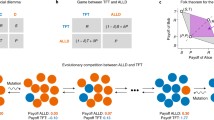Abstract
Humans often defy rational-choice theory by cooperating in simple dilemma games1, a paradox that has been explained by theories of kin selection2, reciprocal altruism3 and indirect reciprocity (reputation)4. Fehr and Gächter claim that human cooperation remains an evolutionary puzzle because people will cooperate with genetically unrelated strangers, often in large groups, with people whom they may not meet again, and without any gain in reputation ('strong reciprocity')5 — that is, when existing theories do not seem to apply. However, we argue that those theories are rejected for the wrong reasons and that the paradox may therefore be imaginary. This has implications for whether punishment is crucial to promoting cooperation5,6,7,8.
Similar content being viewed by others
References
Henrich, J. et al. Am. Econ. Rev. 91, 73–78 (2001).
Hamilton, W. D. J. Theor. Biol. 7, 1–52 (1964).
Trivers, R. L. Q. Rev. Biol. 46, 35–57 (1971).
Alexander, R. D. The Biology of Moral Systems (Hawthorne, Aldine, New York, 1987).
Fehr, E. & Gächter, S. Nature 415, 137–140 (2002).
Clutton-Brock, T. H. & Parker, G. A. Nature 373, 209–216 (1995).
Ostrom, E., Walker, J. & Gardner, R. Am. Polit. Sci. Rev. 86, 404–417 (1992).
Sober, E. & Wilson, D. S. Unto Others: The Evolution and Psychology of Unselfish Behaviour (Harvard Univ. Press, Cambridge, Massachusetts, 1998).
Henrich, J. & Boyd, R. J. Theor. Biol. 208, 79–89 (2001).
Sosis, R. Cross-Cult. Res. 34, 71–88 (2000).
Author information
Authors and Affiliations
Corresponding author
Rights and permissions
About this article
Cite this article
Johnson, D., Stopka, P. & Knights, S. The puzzle of human cooperation. Nature 421, 911–912 (2003). https://doi.org/10.1038/421911b
Issue Date:
DOI: https://doi.org/10.1038/421911b
- Springer Nature Limited
This article is cited by
-
Cooperation dynamics in spatial public goods games with graded punishment mechanism
Nonlinear Dynamics (2023)
-
Exploring Relationships Among Belief in Genetic Determinism, Genetics Knowledge, and Social Factors
Science & Education (2017)
-
Ultimate and proximate explanations of strong reciprocity
History and Philosophy of the Life Sciences (2017)
-
Public goods with high-powered punishment: high cooperation and low efficiency
Journal of Bioeconomics (2015)
-
Nonhuman Species’ Reactions to Inequity and their Implications for Fairness
Social Justice Research (2006)





